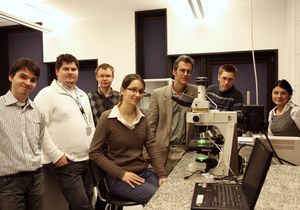FNP Team Project
From Laboratory of Modeling in Biology and Medicine
Mechanistic aspects and spatial effects in cell signalling
within TEAM Programme sponsored by the Foundation for Polish Science, 2009–2013
Concepts and objectives
The leading aim of the project is to identify and study the turning points in molecular pathways of immune response and cancer, in which the single cell fate, understood as a choice between apoptosis, senescence, proliferation, differentiation or cell cycle arrest, is decided. As a model molecular pathways we will consider these related to innate and adaptive immune response and cancer, in which we have expertise. The project will be realized both by means of numerical simulations and theoretical analysis.
TEAM project laureates
Postdocs:
- Sławomir Błoński
- Piotr Szopa (till 31.01.2012)
Ph.D. Students:
- Michał Dyzma
- Joanna Jaruszewicz
- Paweł Kocieniewski
M.Sc. Students:
- Marta Bogdał
- Dominika Nowicka
- Jakub Pękalski (till 31.08.2011)
- Paweł Żuk (till 30.09.2011)
Financed topics
- Theoretical modeling and experimental analysis of regulatory pathways connected with innate immune response. The candidates are expected to have laboratory experience or/and knowledge in the field of mathematical biology, stochastic processes and differential equations
- Evolution and co-evolution of genes (and their regulatory regions) related to IRF3 and NF-κB pathway. Such analysis will be helpful in analysis of crosstalk of IRF3 and NF-κB pathways. The evolutions of genes is related to their biological importance, typically well conserved genes play key roles in the regulatory pathway. Transcription factors IRF3 and NF-κB play central role in innate immune responses. The student will have to learn BLAST (Basic Local Aligment Search Tool) and how to use genome databases and clustering tools.
- Mutations of p53 pathways genes in various types of cancer. Various types of cancers are associated with specific mutations of p53, Mdm2, Akt, PTEN and other regulating genes. The students will have to search databases to find the mutations (or deletions) and analyze what is their potential impact on dynamics of p53 regulatory pathways we consider.
Team members
- Tomasz Lipniacki – principal investigator (Institute of Fundamental Technological Research, PAS, Warsaw, Poland)
- Bogdan Kaźmierczak (Institute of Fundamental Technological Research, PAS, Warsaw, Poland)
- Beata Hat-Plewińska (Institute of Fundamental Technological Research, PAS, Warsaw, Poland)
- Marek Kochańczyk (Jagiellonian University, Krakow, Poland)
- Aleksandra Nowicka (Institute of Theoretical Physics, PAS, Warsaw, Poland) – till 01.10.2011
External collaborators
- Mark Alber (Notre Dame University, US)
- Allan R. Brasier (University of Texas Medical Branch, Galveston, TX, US)
- James R. Faeder (University of Pittsburgh School of Medicine, US)
- William S. Hlavacek (Los Alamos National Laboratory, US)
- Marek Kimmel (Rice University and MD Anderson Cancer Center, Houston, TX, US)
- Vitaly Volpert (Université Claude Bernard - Lyon 1, France)
- Michael R.H. White (Liverpool University, UK)


